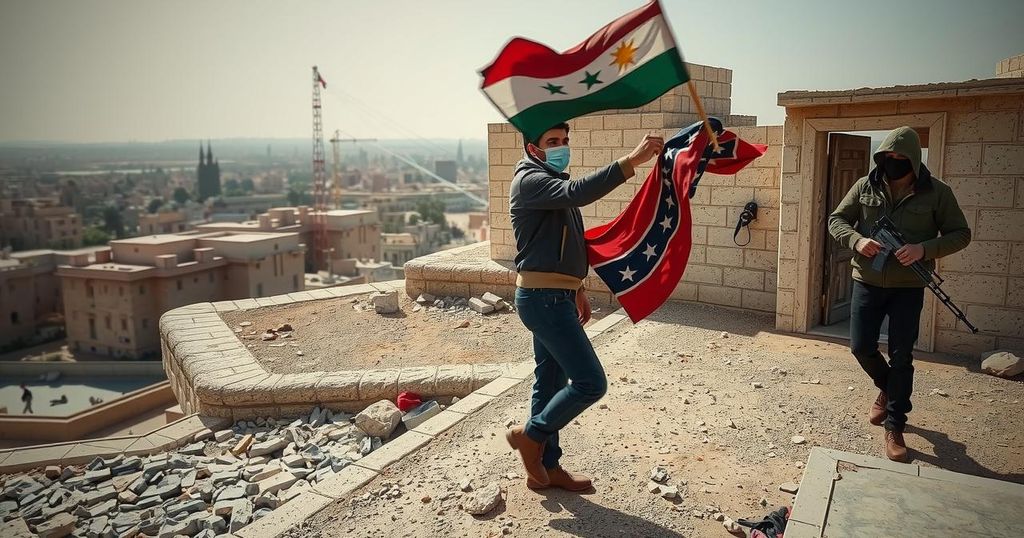Syria has recently liberated itself from the control of Russia and Iran, igniting celebrations among its citizens while simultaneously grappling with the grim realities of lost lives and uncertain governance. The coalition led by Hayat Tahrir al-Sham appears to promote inclusivity and has formed a transitional government under Mohammad al-Bashir. However, significant challenges remain from both internal factions and external threats, including ongoing Western sanctions and military incursions, jeopardizing the new freedoms gained.
The recent liberation of Syria from the oppressive regimes of Russia and Iran has ignited profound emotions among the Syrian populace. In the aftermath of the fall of Bashar al-Assad, millions filled the streets to celebrate newfound freedoms, prominently featuring women, who had remained largely sidelined during the oppression. Families have begun to reunite, although many must now confront the painful realization that loved ones are among the over 130,000 victims of torture in Assad’s prisons, with numerous mass graves uncovered across the country.
The final collapse of the Assad regime owes much to the effective social governance displayed by the rebel coalition led by Hayat Tahrir al-Sham (HTS). The absence of hostility toward diverse communities in liberated zones encouraged numerous soldiers to defect. While some apprehensions about HTS’s leadership persist, Ahmed al-Sharaa has demonstrated an understanding of the need for a broad-based leadership that respects Syria’s diverse fabric. His astute leadership has been pivotal, as he recognizes the limitations of ruling independently: “Someone who rigidly clings to certain ideas and principles without flexibility cannot effectively lead societies or navigate complex conflicts.”
Furthermore, the new transitional government, led by Prime Minister Mohammad al-Bashir, is rooted in delivering services and fostering collaboration among various factions. Central to Syria’s unity and stability is an inclusive constitutional process that accommodates all communities, including Alawites and secularists who are tentatively optimistic about their roles in this new era. The challenge persists as the opposition coalition, while diverse, grapples with its lack of governance experience and external influences.
Compounding the Syrian situation are external threats, with regions like northeast Syria facing Turkish incursions and rising tensions among local factions. The Syrian Democratic Forces (SDF), aligned with the PKK, are engaged in complex dynamics that necessitate careful navigation by the new government. Assurances have been made to the Kurdish population regarding their rights within a reconciled Syria, which must be prioritized for sustainability.
Significantly, Western sanctions remain in place despite the regime’s downfall, with the United States and European Union perpetuating restrictions while Israel continues to expand its foothold within Syrian territory. The escalation of military operations, characterized as a preemptive strike on a nascent independent Syria, underscores ongoing geopolitical hostilities. Nevertheless, there is optimism that Syria will ultimately prevail, reclaiming its sovereignty through the agency of its people, heralding a new chapter marked by liberation and potential.
The liberation of Syria from authoritarian rule represents a significant historical turning point, stirring hope among its citizens who endured years of conflict and repression. The dynamics of the post-Assad landscape are complex, with various factions, including HTS, emerging in prominent roles. Additionally, regional and international influences remain pivotal as Syria navigates challenges to its sovereignty, unity, and governance amid competing interests and ongoing military threats.
In conclusion, the liberation of Syria marks a poignant moment in its history where the aspirations for freedom are converging with the complex realities of governance and external pressures. The formation of an inclusive government and societal cohesion remain critical to the country’s recovery. While external hostilities pose serious challenges, the resilience and agency of the Syrian people are likely to shape the future trajectory of their nation. The transition towards self-determination is fraught with difficulties, yet there lies an undeterred spirit among Syrians willing to reclaim their destiny.
Original Source: www.theguardian.com






